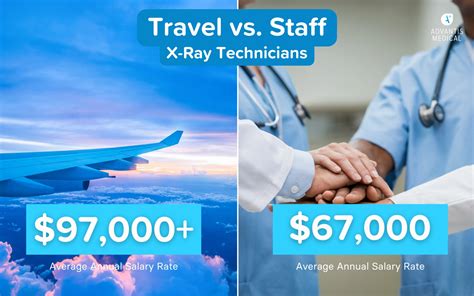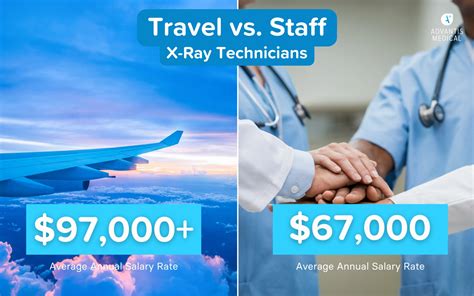For certified radiologic technologists with a sense of adventure, the world of travel assignments offers a unique and powerful way to advance their careers. This path not only provides diverse clinical experiences but also comes with significant financial rewards. A travel X-ray tech can expect to earn a salary that often surpasses that of their stationary counterparts, with top earners reaching well into the six-figure range.
This guide will break down the salary you can expect as a travel X-ray technologist, the key factors that influence your pay, and the promising outlook for this dynamic career.
What Does a Travel X-Ray Tech Do?

A travel X-ray technologist, or traveling radiologic technologist, is a certified professional who takes on short-term assignments at various healthcare facilities across the country. These assignments typically last from 8 to 26 weeks and are designed to fill temporary staffing shortages caused by seasonal demand, medical leave, or staff vacancies.
While their core duties mirror those of a permanent tech—operating diagnostic imaging equipment, positioning patients, ensuring patient safety, and producing high-quality images for physicians—travel techs must also be highly adaptable. They need to quickly learn new hospital protocols, integrate with different teams, and master various types of equipment with minimal orientation. This blend of technical skill and professional flexibility is what makes them so valuable.
Average Travel X-Ray Tech Salary

While a staff radiologic technologist earns a solid income, travel X-ray techs operate in a different pay stratosphere. The compensation structure for travel roles is unique and often more lucrative.
The U.S. Bureau of Labor Statistics (BLS) reports that the median annual wage for all Radiologic and MRI Technologists was $73,410 as of May 2023. This figure serves as an excellent baseline for a staff position.
However, travel X-ray technologists earn significantly more due to the nature of their work. Their compensation is typically a "blended rate" that includes:
- A taxable hourly wage.
- Tax-free stipends for housing and meals (if they are duplicating expenses).
Because of this structure, their take-home pay is often substantially higher. According to recent data from reputable sources:
- Salary.com reports the average annual salary for a Travel X-Ray Technician in the United States is around $95,951, with a typical range falling between $85,821 and $105,433.
- Glassdoor estimates the total pay for a Travel X-Ray Tech is approximately $112,561 per year, combining a base salary and additional pay like bonuses or profit sharing.
- ZipRecruiter often frames compensation in weekly terms, which is common for travel contracts. They show that weekly pay can range from $1,800 to over $3,000, which could translate to an annual gross income of $93,000 to $156,000 or more, depending on the number and type of contracts taken per year.
It's important to note that this higher income potential is directly tied to a technologist's qualifications, flexibility, and the specific details of each assignment.
Key Factors That Influence Salary

Your earning potential as a travel X-ray tech isn't a single, fixed number. It's a dynamic figure influenced by several critical factors. Understanding these elements can help you strategically maximize your income.
### Level of Education
While an Associate of Science (A.S.) in Radiologic Technology is the standard educational requirement to enter the field, further education can provide a competitive edge. Holding a Bachelor of Science (B.S.) may open doors to leadership-focused travel assignments or positions at prestigious academic medical centers, which can sometimes offer higher pay. However, the most crucial educational component is your certification. All travel techs must be certified by the American Registry of Radiologic Technologists (ARRT) and hold state licenses for the locations where they accept contracts.
### Years of Experience
This is one of the most significant factors in the world of travel healthcare. Facilities hiring travelers need professionals who can start contributing immediately with minimal supervision. For this reason, most staffing agencies require a minimum of one to two years of recent, direct experience in a hospital setting before they will place you in a travel role.
- 1-3 Years: You are eligible for many travel assignments and can build a strong foundation.
- 3-5+ Years: You become a highly desirable candidate. With a proven track record, you can access assignments at top-tier facilities, specialized units, and "crisis rate" contracts, which offer the highest pay scales.
### Geographic Location
Where you work matters immensely. Salary and stipends are heavily influenced by local demand and the cost of living.
- High-Demand & High-Cost States: States like California, Hawaii, Washington, and Oregon consistently offer the highest pay for radiologic technologists, according to the BLS. Travel contracts in these states reflect this, providing robust hourly wages and stipends to match the high cost of living.
- Rural or Underserved Areas: Sometimes, facilities in more remote locations will offer premium pay to attract skilled technologists who are willing to relocate for a short-term assignment.
- Stipend Rates: The tax-free stipend portion of your pay is determined by the General Services Administration (GSA) per diem rates for that specific city or county. A contract in San Francisco will have a much higher housing and meals stipend than a contract in a small Midwestern town.
### Company Type
The staffing agency you partner with plays a pivotal role in your career and compensation. Different agencies offer different benefits.
- Large, National Agencies: Often have exclusive contracts with major hospital systems, offering a wide variety of assignments and comprehensive benefits packages (health insurance, 401(k), etc.).
- Boutique or Specialized Agencies: May offer more personalized, one-on-one support from a recruiter who truly understands your niche. They can sometimes be more flexible with negotiations.
It's wise to connect with multiple recruiters from different agencies to compare offers and find the best fit for your financial and career goals.
### Area of Specialization
A general X-ray technologist is always in demand, but those with advanced certifications and skills in multiple modalities are in a league of their own. Specialization is a direct path to higher-paying contracts.
- CT (Computed Tomography): Technologists certified in both X-ray and CT are extremely marketable.
- MRI (Magnetic Resonance Imaging): MRI is a high-demand, high-paying specialty.
- Interventional Radiology (IR): This complex and critical field commands some of the highest salaries for travel technologists due to the specialized skill set required.
- Mammography/Cardiovascular: Holding additional credentials in these areas also significantly increases your value and earning potential.
The more modalities you are proficient in, the more indispensable you become, allowing your recruiter to negotiate a premium rate on your behalf.
Job Outlook

The future for radiologic technologists is bright and stable. The U.S. Bureau of Labor Statistics projects that employment for radiologic and MRI technologists will grow by 6% from 2022 to 2032, which is faster than the average for all occupations.
This steady growth is driven by an aging population that requires more diagnostic imaging to diagnose and manage medical conditions like cancer and Alzheimer's disease. This consistent demand ensures a continuous need for skilled technologists, and by extension, a robust market for travelers needed to fill temporary gaps and support overburdened facilities.
Conclusion

A career as a travel X-ray technologist offers a remarkable combination of professional growth, personal adventure, and financial reward. While the baseline salary for a staff technologist is strong, the opportunity to travel allows you to significantly amplify your earnings, potentially reaching $85,000 to $130,000+ per year.
Your ultimate salary will be a reflection of your experience, your willingness to specialize, your flexibility with location, and your choice of staffing agency. For the certified, adaptable, and skilled technologist ready for a dynamic work environment, the path of a travel X-ray tech is not just a job—it's a high-reward strategy for building a prosperous and exciting career in healthcare.
